Photo by Børge Mælum on Unsplash
I’ve probably said in more than one post on this site that there’s nothing quite as magical as a board game night with your closest friends. Unfortunately, social distancing is a concept that looks like it’s going to be around for awhile, so this may not always be possible.
Furthermore, there are plenty of other situations where you may not be able to gather friends around the table. For instance, you or a friend might have moved away. Perhaps inclement weather is preventing anyone from traveling.
In any case where there’s distance between you and your friends, you can always turn to Tabletop Simulator to play board games together. In this post, I’m going to take a look at several board games that I think would be excellent to play on Tabletop Simulator with your friends and family.
Best Board Games to Play on Tabletop Simulator
Mysterium
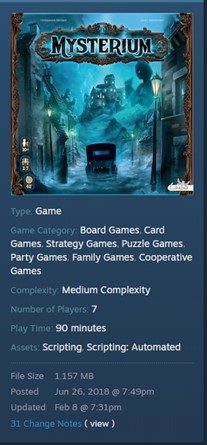
I’ve recommended Mysterium on a couple other lists, including my list of the best horror-themed board games for adults. I’m recommending it again here because, although it took us a long time to work through the rules the first time I played it, I don’t think it’s an overly complicated game.
It won’t take you too long to set up, especially with many workshop mods including scripting. Additionally, once it’s set up, there aren’t necessarily tons of moving pieces to worry about.
Horror games are a major weakness of mine, and Mysterium really checks that box for me. One player gets to be the ghost, and all the others are mediums attempting to figure out how the ghost died. The ghost gives them clues each round by providing them abstract pictures – kind of like a game of supernatural charades, I guess.
Pros:
- It has a great spooky theme that I think many people will enjoy.
- The artwork on the pieces is vivid and beautiful.
- You don’t necessarily need a ton of people to play it.
- The game doesn’t take more than an hour generally.
Cons:
- The first time you play it, it can take a little time to pick up the rules.
- You probably wouldn’t want to play it over and over again with the same group of people. It might be kind of easy to pick up the types of clues particular players will give when they’re the ghost.
Azul
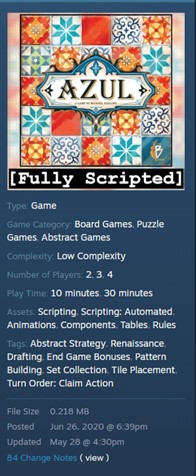
If you were to see a screenshot of the board once it’s set up, you might look at it and balk at the complexity. In Tabletop Simulator, such complexity can be off-putting, especially when you consider having to delicately manipulate each piece into place with the game’s finicky controls and physics.
Fortunately, this version of Azul is fully scripted. This means that the setup can be completed in mere seconds – much quicker than if you were playing the game in real life.
Azul is a game that is essentially about making art. Each player represents a tile layer, and you draw tiles on your turn to lay on your board. Points are scored based on the patterns you make and your tile placement.
Pros:
- Fully scripted, which means a painless and quick setup.
- Easy for beginners.
- Games can be played relatively quickly.
- Supports up to four players.
- You’ll feel like an artist as you progress your patterns.
Cons:
- Veteran board game players might find the game to be too simple.
- Unless you want to play it several times in a row, you might want to find a different board game if you’re looking for something you can spend a whole evening playing.
The Scripts of Catan (Settlers of Catan)
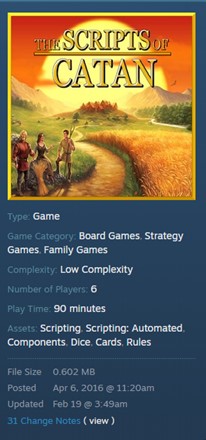
To be honest with you, I’m not personally a big fan of Settlers of Catan. Given that I enjoy games like Sid Meier’s Civilization, I couldn’t tell you exactly why I don’t like Settlers – just that I don’t.
Nevertheless, I can’t deny the fact that it’s an incredibly popular and beginner-friendly game. I don’t think I could skip it here, so I’ve included The Scripts of Catan, which is a fully scripted Tabletop Simulator version of the game.
This one will take you around an hour and a half to complete, so it’s a good one to play if you want something a little longer. As I mentioned previously, it’s also very simple to learn. If you’ve got any children or newbies playing, they won’t have a difficult time picking it up.
Pros:
- Usually takes over an hour to play, making it perfect for longer board game nights.
- Has an addictive resource-gathering and trading theme.
- Simple gameplay that players of all skill levels will be able to adjust to.
- Because it’s fully scripted, you won’t struggle to set the board up.
- The version I referenced to has the 5-6 player expansion pack incorporated, so it will likely fit your whole playgroup.
Cons:
- None that I can think of that aren’t specific to me personally.
Read Next: Best Board Games with Expansion Packs
Mage Knight Plus
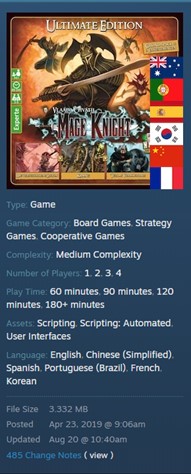
Allow me to give you a full disclosure quick here: I’ve never actually played Mage Knight. However, I do know that it’s a classic board game beloved by people all over the world, so I didn’t feel right skipping over it.
What I do know is that it’s a more complex board game that may be better suited to intermediate or advanced board game players. Each person is a Mage Knight (go figure) who is exploring a map, gaining new spells and attacks to add to their decks.
The good news about the specific mod I pictured above is that it’s scripted. The setup and turn order are automated, allowing you to sink into the game without having to worry about carefully arranging the board.
Pros:
- Better for small groups of up to four people.
- A good choice for fantasy fans.
- Since games can take a longer amount of time, it may be more suitable to nights you want to dedicate to a single board game.
- Fully scripted, which means that most of the setup and turn order is handled for you.
- Available in several different languages.
Cons:
- Although scripting will make it easier, I think it will still likely take some time to learn the game.
Betrayal at House on the Hill
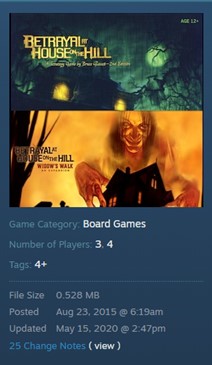
Betrayal at House on the Hill might have been a riskier choice to include on this list. It’s got tons of pieces, the set up can be a bit complex, and the game changes each time depending on the scenario you selected…but it’s just so fun, I couldn’t help but mention it.
If you’ve never gotten the chance to play it in real life, I strongly recommend you give this spooky game a shot in Tabletop Simulator. It’s sort of like a customized Call of Cthulhu session, in that you get to play through a different horror story pretty much every time.
Each player is a person investigating a haunted house. The shape and layout of the house changes every time you play, because players must lay down a tile on their turns to slowly build the house. Towards the end of the game, one player will be chosen at random to become the traitor – hence the name Betrayal at House on the Hill – and actively work against the rest of the players to stop them from escaping the house.
Pros:
- I strongly recommend this one to any horror fan.
- The game feels a little different each time because you can get different stories to play through.
- The map changes every time you play.
- The above-pictured mod features an expansion to add more gameplay.
- Suitable for small gatherings of people.
Cons:
- This may not be a good game to play with children due to some intense horror themes.
- As far as I can tell, this mod isn’t scripted, so it can be a bit complicated setting the board and the characters up.
The Impossible Game
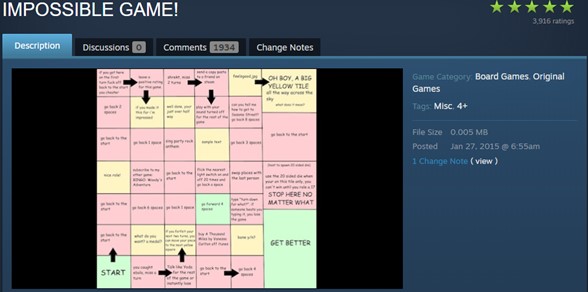
Indulge me, if you will, in a moment of stupidity by including The Impossible Game on this list. I’ve only played this monstrosity once, and I honestly don’t know if I’ll ever play it again. I don’t know what to compare it to. It seems like something some quirky kid in middle school would make up to piss off their friends.
All this is because The Impossible Game, at its core, is a game that is damn near impossible to complete. You will roll a die to (if I remember correctly) to progress over the board, and almost every single tile you land on will set you back another few tiles or make you do something embarrassing. The game ends when someone finally makes it to the end tile.
But honestly, that kind of frustration and chaos is surprisingly fun. This is a great one to break out with your more open-minded friends (or possibly friends who are drunk).
Pros:
- Extremely simple gameplay.
- Chaotic tile actions will make your playgroup laugh (if they don’t go insane).
- It takes absolutely no time to set up.
Cons:
- For the wrong group of people, I could see The Impossible Game being an experience that is simply too frustrating.
- I don’t think I would describe it as appropriate for children.
- There is a good chance you will only ever want to play it once.
Clue
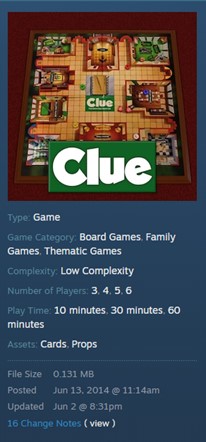
Clue is one of those board games you can break out at virtually any party or gathering. It’s not too complex either in terms of gameplay or story. Your mission is simple: you are playing as an investigator trying to solve how and where a murder was committed, in addition to who committed the murder.
These three factors are determined at the beginning of the game, when a person, weapon, and location card are put into an envelope to be concealed from the players. There are a few hundred possibilities, so it’s unlikely you’ll experience two of the same scenarios in consecutive games.
This one isn’t scripted, unlike many of the others I chose to include on this list, but it doesn’t take long to get it set up. There also aren’t a ton of moving parts.
Pros:
- Several people can play at once, so you probably won’t leave anyone out.
- Games can be relatively short, making it perfect for nights where you have other plans.
- You can quickly set it up, as there are not tons of moving parts.
- Very beginner-friendly.
- Great for those into true crime shoes, podcasts, or books.
Cons:
- If you’re expecting a challenging Who Dunnit style sort of game, I don’t think you really get that completely from Clue. Because the solutions are randomized, they feel randomized, so you don’t get to use your critical thinking skills as much as I’d like.
Jumanji

Have you ever seen the movie Jumanji and wished you could play the chaotic board game in real life? Well, now you can – sort of. Granted, it’s virtually in Tabletop Simulator, but that’s likely as close as you’ll get to the real thing, anyway, and that’s probably a good thing.
Jumanji, like The Impossible Game, is very simple. You roll dice and move a number of spaces equal to the value of your roll. As you progress across the board, random events will occur based on cards you draw that cause you to move back and forth.
Sadly, you’re not going to set a feral Robin Williams free in your home or get attacked by killer bees. There aren’t any animations depicting these events in Tabletop Simulator, either.
Pros:
- You can learn to play it in minutes.
- Supports up to four players.
- Perfect for people with 90’s nostalgia.
- Doesn’t take much to set up.
Cons:
- Without the crazy events that actually happen in the movie, it’s almost kind of boring.
How to Choose a Board Game to Play on TTS
Tabletop Simulator opens up the realm of board game possibilities. You don’t necessarily need to own physical copies of the game or pay for them – there are tons of fan-made mods you can subscribe to for a huge array of board games.
So, how do you decide which one to dedicate your virtual game night to? There are at least four main factors I recommend considering:
- Learning curve
- Duration
- Theme
- Ease of Setup/Movement
Learning Curve
In virtually all board game articles I write, one thing I will consistently mention is learning curve. Basically, learning curve refers to how difficult it is for new players to pick up the game.
Veteran board game players are generally going to be more comfortable playing a game with a higher learning curve than new players. Similarly, I’d recommend board games with a shallower learning curve for young children or senior citizens who might not have the patience to learn complex games. (At least, I know my grandma wouldn’t want to spend hours just looking at the rules.)
Unfortunately, learning curve isn’t always something you can determine right away. You may need to look at player reviews of the board game or pull up a YouTube video about how to play it to get a better feel for its complexity.
Duration
Another common consideration should be how long the board game is. I don’t know about you, but when I play games with people virtually, we tend to focus on one game for the duration of the session rather than switching between multiple. That’s because it’s easier to coordinate and be sure everyone has access to the game in question then.
For that reason, I’m much more willing to play board games with a longer duration online than I might be in person. However, this could easily be different for you; maybe you subscribed to a bunch of board games on Tabletop Simulator, and you’re eager to try as many as possible.
Whatever your preference is, it’s important to think about how much time you want to spend on a given board game. The good news is that there are so many to choose from, you won’t have a difficult time picking one that’s ideal for your unique preferences.
Theme
Theme is another thing I will always talk about when it comes to board and card games. It’s no different here.
There’s a board game for every theme you can think of. Thus, if your friend group is into horror, you’ll be able to look for plenty of horror games. I’ve even included a couple of them on this list. The same thing applies to any other thing you’re into.
Ease of Setup/Movement
If you’ve put a lot of time into Tabletop Simulator, you’ve probably gotten used to how it feels to manipulate the environment inside it. Those who only play it occasionally or new players, however, won’t be as comfortable moving pieces. The physics can get a little weird, after all.
That’s why I think it’s important to consider how many pieces the game has, how long it takes to set up, and how many parts will need to be moved throughout the course of the game. If it’s an extremely complicated game with hundreds of components – many of which move turn by turn – then it may not be the best board game choice for new players.
That being said, there are many board games on Steam that have scripting for your convenience. Scripting can automate certain aspects, such as the setup or various movements. This can make even more complex games like Gloomhaven much simpler to manipulate.
Wrap Up
Don’t let distance fool you into thinking that you can’t play board games with your friends. If you and your playgroup all have decent PCs, you should be able to run Tabletop Simulator on them – and that means you can play a plethora of board games for free.
With that in mind, if you play one of the modded board games I recommended in Tabletop Simulator and you really enjoy it, consider purchasing a physical copy of that game. That way, you can support the creators of the game for their hard work.
